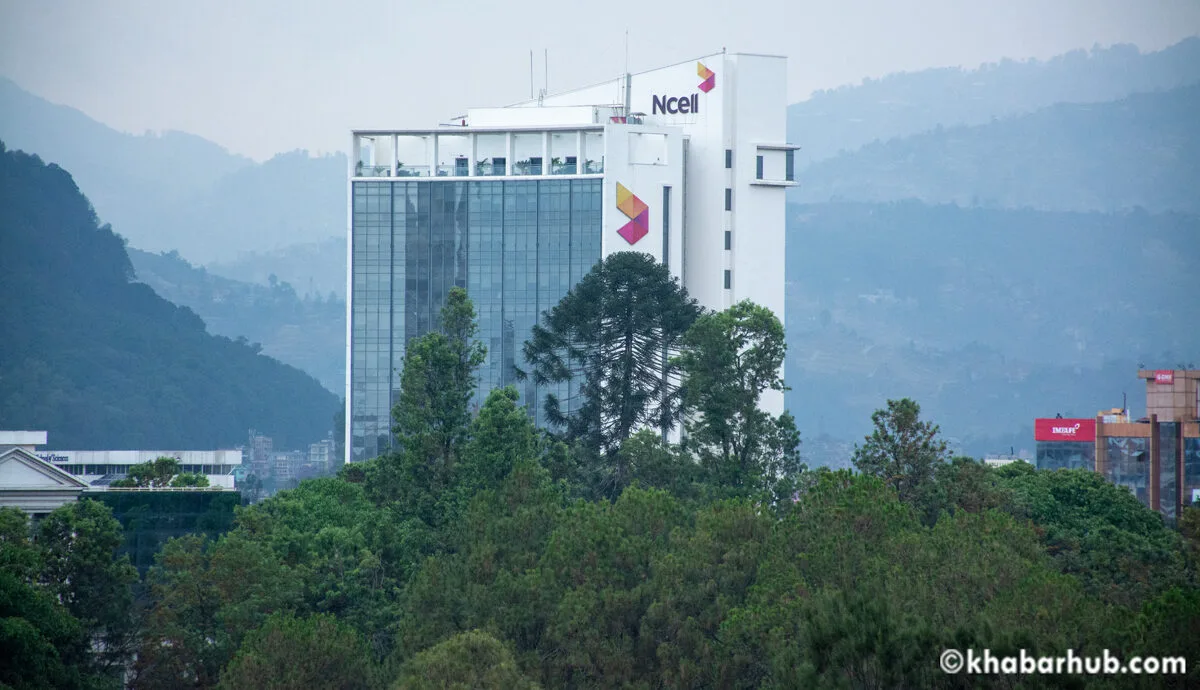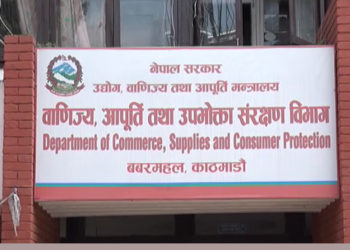KATHMANDU: Over the last decade, the communication and information technology sector has seen rapid global development.
This sector is not only expanding at a remarkable pace but is also proving to be highly profitable.
Despite Nepal’s reliance on imports for information technology, the communication sector has made significant progress.
The two largest telecommunications companies operating in Nepal are generating billions in profits annually, and these companies have been expanding their services nationwide.
However, confusion has arisen due to a recent announcement by Axiata, a Malaysian company that acquired an 80 percent stake in Ncell.
On December 1, 2023, Axiata issued a press release declaring its intention to sell its shares, citing a lack of favorable business environment in Nepal.
The investigation revealed that Axiata’s announcement regarding the sale of Ncell shares, without fulfilling legal requirements, constituted a breach of the law.
Ncell, which received a total of $80 million in foreign investment, has reported over a billion dollars in profit over 18 years.
Despite this, Axiata’s claims seem to suggest a negative view of Nepal’s business climate.
A government investigation has found that Ncell has repeatedly violated Nepali laws while earning substantial profits relative to its investment. The investigation suggests that Axiata’s allegations are unfounded.
Axiata’s Statement: Baseless Allegations
The government investigation deems Axiata’s claims as baseless and objectionable.
According to the inquiry committee’s report, page 56 provides a detailed analysis of Axiata’s statement.
Axiata’s press release cited issues such as ‘regulatory uncertainty, unfair tax assessment, an unfavorable environment for foreign investment protection, and concerns over license expiration.’
The investigation committee found no evidence supporting accusations of regulatory uncertainty or unfair tax assessments.
Regarding the license expiration, Axiata was aware that the license would be valid for 25 years, expiring in 2029, when it purchased Reynold Holdings in 2007.
The committee has criticized Axiata for making baseless claims about property rights, given that Nepal’s laws on this matter are clear.
Page 58 of the report refutes the claim that the business environment was difficult during Nepal’s political conflicts, noting that the environment improved significantly following the adoption of the constitution.
Furthermore, Axiata’s financial statements reveal that its investments in Sri Lanka, Bangladesh, and Indonesia have not been as profitable as those in Nepal.
Page 59 of the report underscores that Axiata’s profits from Ncell Nepal surpass those from its operations in other countries, challenging the claim that Nepal’s business environment is unfavorable.
The committee’s report emphasizes that the government should address the issue of misinformation being spread by Axiata, which could deter other potential investors despite the positive investment outcomes experienced in Nepal.
After joining the Axita Group and acquiring Ncell, the company has consistently reported strong profits in its financial statements from fiscal years 2072 BS to 2079/80 BS.
The investigation report highlights that Ncell’s financial performance does not support the claims that Nepal’s business environment is unfriendly.
Contrarily, Axiata has accused Nepal of violating legal standards. Axiata, which acquired shares in Ncell through an offshore entity, operates Ncell according to Nepali laws but has alleged that Nepal’s business environment and regulatory framework are problematic.
According to the Nepal Telecommunications Regulations, 2054 BS, approval from the Nepal Telecommunications Authority is required before buying or selling more than 5 percent of shares.
Furthermore, applications must be made in accordance with Regulation 4 of the Nepal Telecommunications Authority Regulations, 2076 BS.
The committee’s report advises the government to scrutinize investment holding structures from tax haven countries, emphasizing that it is crucial to determine whether these companies have adhered to required conditions and to investigate potential tax evasion and other related issues.
However, despite holding 80 percent of Ncell’s shares, Axiata announced the sale of its shares in December 2023 without obtaining the necessary permissions from the Authority.
Moreover, the sale of 100 percent of its shares would transfer both the ownership and license of Ncell.
The investigation confirms that Axiata violated legal requirements by proceeding with this sale.
The Telecommunications Act mandates that only entities with the prescribed qualifications may operate telecommunications organizations.
The investigation revealed that Axiata’s announcement regarding the sale of Ncell shares, without fulfilling legal requirements, constituted a breach of the law.
During discussions with the investigation committee, Satish Lal Acharya indicated that he submitted documents only after being informed about the share acquisition.
Ncell’s current executive officer, Jabbor Kamuyov, stated that the issue would be handled by shareholders and directors. However, the committee’s report does not mention discussions with the Axiata Group.
Since Axiata has sold 100 percent of its shares to Reynolds Holdings, the transfer of ownership is deemed complete.
As noted on page 74 of the report, approval from the Authority should have been obtained prior to the sale.
Page 75 of the report highlights that after Axiata’s unlawful sale of shares, Ncell applied to the Department of Industry to record the changes related to the share transaction without informing the Telecommunications Authority.
The application lacked necessary documentation, and progress has stalled due to a Council of Ministers’ decision.
Section 19(d) of the Foreign Investment and Transfer Act, 2075, requires both parties to jointly apply for a permit transfer. Axiata and Satishlal violated this provision.
Additionally, Section 23 of the Telecommunications Act, 2053, stipulates that operators must submit financial and technical reports and operational plans for their telecommunications services.
The report notes that Acharya, who recently acquired 80 percent of Ncell’s shares, did not provide income details.
Page 77 of the report indicates that the buyer, who obtained and renewed the smart cell permit, lacks the capability to operate Ncell.
At the time of Axiata’s exit, it owned 80 percent of Ncell’s shares, while the remaining 20 percent were held by Sunivera Capital Ventures Pvt Ltd, a company owned by Acharya’s wife, Bhawana Singh Shrestha.
The report states: “There is no experience in financial transactions or service operations, no brand value, no direct management experience, or majority share investments in capital markets, which raises concerns about the buyer’s capability to manage a company like Ncell.”
The government investigation report also emphasizes that regulating Ncell’s share trading will not deter foreign investment.
The telecommunication sector, a critical component of the economy, requires significant investment to ensure long-term sustainability.
Pages 81 and 82 of the report analyze how investment from tax havens, such as Ireland and St. Kitts and Nevis, often aims to disrupt local contracts through offshore transactions, reflecting a broader trend in global investments.
The committee’s report advises the government to scrutinize investment holding structures from tax haven countries, emphasizing that it is crucial to determine whether these companies have adhered to required conditions and to investigate potential tax evasion and other related issues.
The report highlights that Axiata acted irresponsibly by transferring Ncell to an individual who had previously failed to meet investment conditions in other Nepali telecommunications companies without obtaining prior approval.
Page 78 of the report notes that the necessary documents required by the Act and Regulations were not submitted.
The inquiry committee has recommended discouraging the type of investment structure involved with Ncell.
According to page 84 of the report, the creation of multi-layered companies involving both local and foreign entities—where mutual responsibilities and relationships remain unclear—creates an opaque investment environment.
Such practices are detrimental to the business climate and should be avoided.
The report states: “The establishment of companies by both indigenous and foreign entities in a manner that obscures their mutual relationships and responsibilities leads to illegal business practices and investment. This behavior pollutes the business environment, and thus, it should be discouraged to foster a transparent investment climate.”
On December 1, 2023, Axiata Group, which held an 80 percent share in Ncell, announced the sale of all its shares in the company. Ncell, previously known as Spice Nepal Pvt Ltd was established to provide mobile services in Nepal.
Azia sold 100 percent of its Ncell shares to Spectralite UK Limited, a company owned by Singaporean Satish Lal Acharya, through Reynolds Holdings, which is based in St. Kitts and Nevis.
The media has prominently featured this issue, and various parliamentary committees, including the Public Accounts Committee, Finance Committee, State Affairs and Good Governance Committee, and Education and Information Technology Committee, initiated inquiries involving the government, regulatory bodies, and officials.
According to the financial statement for the fiscal year 079/80, Axiata sold its 80 percent stake in Ncell for 6.5 billion rupees, despite the company having made a profit after tax of 4.25 billion 44 million rupees.
The payment for the shares is to be completed in installments by December 29, 2029.
Axiata had originally purchased these shares seven years earlier in partnership with Teliasonera of Sweden for 1 billion 44 million 78 thousand 25 rupees.
Following the sale, Satish Lal Acharya’s family now controls all of Ncell’s shares, except for 11 shares.
At the time of Axiata’s exit, it owned 80 percent of Ncell’s shares, while the remaining 20 percent were held by Sunivera Capital Ventures Pvt Ltd, a company owned by Acharya’s wife, Bhawana Singh Shrestha.
Axiata’s announcement of the sale at a significantly reduced price raised considerable concern among Nepali citizens, media, regulators, and political figures.
The issue of capital gains tax from the transaction between TeliaSonera and Axiata remains unresolved, and the low price of the recent sale has led to questions about potential tax evasion and other legal issues.
The media has prominently featured this issue, and various parliamentary committees, including the Public Accounts Committee, Finance Committee, State Affairs and Good Governance Committee, and Education and Information Technology Committee, initiated inquiries involving the government, regulatory bodies, and officials.
Additionally, Rishikesh Pokhrel, Chairman of the Public Accounts Committee, sent a formal request to the Commission for the Investigation of Abuse of Authority to examine the sale of Ncell shares.
In response to widespread pressure, the government established a five-member committee led by former Auditor General Tankamani Sharma Dangal.
The committee also included Fanindra Gautam, Secretary of the Government of Nepal; Joint Secretaries Ritesh Kumar Shakya and Baburam Bhandari; and Sujan Kumar Kafle, President of the Nepal Chartered Accountants Association.
The committee completed its investigation and submitted its report to the government. However, the government has yet to officially release the report.
Also Read:
https://english.khabarhub.com/2024/15/381758/
https://english.khabarhub.com/2024/09/371255/
https://english.khabarhub.com/2024/29/367698/
https://english.khabarhub.com/2024/28/367453/
https://english.khabarhub.com/2024/08/370915/
https://english.khabarhub.com/2024/26/367221/
https://english.khabarhub.com/2024/05/368725/









Comment